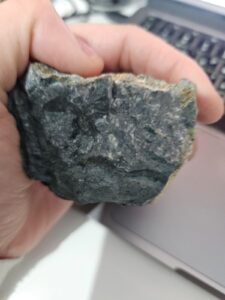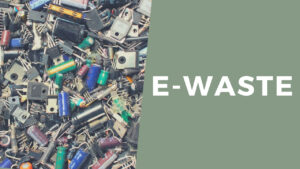The escalating crisis in the Ukraine could have significant impacts on the move towards the green economy. At the same time, the economic outfall of sanctions on Russia will have a lasting effect on companies connected to Platinum Group Metals (PGMs), clean technology and the circular economy.
Geopolitical tension combined with a world-wide push towards greener technology have created the perfect storm for companies invested in the extraction or recycling of PGMs. Moreover, as the world’s investors start placing increased pressure on the extractive sector in terms of Environmental Social and Governance (ESG) standards, Canadian company Mineworx Technologies’ strategic move to formulate a new corporate identity couldn’t have come at a better time.
Mineworx has found a unique niche in processing platinum and palladium from spent diesel catalytic converters. The company moved from being a purely extractive company to playing in the cleantech space within a few years. And its timing couldn’t have been better.
Positioning Mineworx in the growing cleantech space, while substantial PGM shortages in the world looms large amid a devastating war in the Ukraine, could be extremely beneficial for the company. It will enable Mineworx to broaden their story to a more diverse viewership, while increasing its shareholder base, and at the same time allow it better access to institutional investors.

A renewed focus on CleanTech
Although the new Mineworx story is in essence a purely green play operating in the lucrative and expanding circular economy, the company has not relinquished its mining assets completely. The company owns a concession in the Spanish Cehegin iron ore project, which it intends spinning off into a new public company. While iron ore prices have been pretty volatile over the last year, it is again in an upswing, trading at around $150/ton, CIF, China and it is expected to remain important in a post-pandemic, post-conflict, global rebuilding effort.
According to Greg Pendura, CEO of Mineworx, the rationale behind the spin out of their iron ore asset is to enhance shareholder value. He says that it is also the start of a rebranding program for Mineworx, which will include a name change.
“Moving forward we wish to identify ourselves as a cleantech company developing environmentally friendly processing technologies to recover precious metals from sectors other than traditional mining.
“As we begin to increase our institutional investor base in our company, we will be able to attract green funds and interest groups focused on cleantech innovations with the potential to make positive contributions to health and the environment by playing a proactive role in substantially reducing the carbon footprint on our planet,” adds Pendura.
The carbon reduction push, and the inevitable move towards Electric Vehicles (EVs), does not mean the end of the internal combustion engine. What it does mean, however, is legislative-led increased loadings on autocatalytic converters. Diesel and petrol fired vehicles will be around for at least another 10 to 20 years. As countries around the world start implementing stringent emission standards, the demand for platinum and palladium will continue growing exponentially.
With close to 40% of platinum and palladium production expected to be sterilised in Russia because of sanctions over the next few months, and more tonnages being tied up around the world because of shipping bottlenecks caused by the conflict and constraints emanating from Covid-19 lockdowns, an imminent supply deficit will put strain on the world’s biggest producers outside of Russia. Hardly any new PGM projects are expected to come online in the next year to fill the gap. This grim outlook has resulted in a PGM rally of note, which is expected to last for as long as Russia occupies the Ukraine. At the time of writing the fighting remains intense as Russia continues bombarding Kyiv and surrounding towns.
Commodities on the run
Oil, base metals, aluminium, zinc, nickel, and natural gas all recorded strong runs in response to the escalating crisis and subsequent sanctions on Russia. Although the Russian economy is not a big player in global economic terms, the country is one of the largest producers of PGMs in the world.
Russia produces 2.7 million ounces of palladium, which accounts for 38% of global supply. In addition, the country produces close to 10% of platinum and rhodium, 8% of iridium and 4% of ruthenium.
Because Russia produces up to 40% of primary (mined) palladium supply and 14% of platinum supply there is increasing concerns that the Russia-Ukraine war will lead to supply deficits, which plays right into the hands of platinum and palladium recycling companies like Mineworx. At more than USD$2,800 per ounce, Palladium spot prices reached its highest price since August 2021 one week after President Putin’s tanks crossed the Ukrainian border.
Close to 80% of the world’s palladium and 50% of the world’s platinum are used in catalytic converters annually. Worldwide, catalytic converters require close to 13 million oz of platinum and palladium per year to meet the exhaust emission regulations for gasoline.
According to Greg Pendura, CEO of Mineworx, there will be a mind boggling twenty- seven million spent diesel catalytic converters per year only in the USA. Even more outrageous, is that only 30% of those converters will eventually be recycled. It means that there are unthinkable amounts of platinum and palladium locked up in these catalytic converters. Pendura says that close to 50% of the annual global platinum and palladium production is used in diesel catalytic converters. If you can, make the sums, and try to figure out what Mineworx have stumbled upon. Moreover, the ability to be able to process these metals has multiple benefits.
Mineworx’s big focus is thus assorted processing technologies based upon metal extraction. The company started off looking at reprocessing gold which eventually evolved into the recycling of platinum and palladium. “Processing technology that will be able to extract precious metals like platinum and palladium in a cleantech environment will be well received on North American soil,” says Pendura.
This is ground-breaking technology, and Mineworx is first to the market. Their commercial plant, once in full swing, will produce approximately ten tonnes of spent converters per day and revenues are expected to exceed US$100m per plant. These are phenomenal numbers from a business perspective, considering that the recycling of converters is currently (with old technology) worth more than US$25-billion.
Pilot plant soon to be up and running
Meanwhile, the Mineworx pilot plant in Tennessee, USA, is about to begin operations, after experiencing several delays due to moving the location from JV partner Davis Recycling’s building to a different site.
This triggered permitting issues for both the equipment in the pilot plant as well as various city building permit requirements for a stand-alone facility. Initially the permitting process could not start until the replacement components for the faulty items were received.
Additional time was required by the engineering firm as some of the labelling of the electrical components was incorrect and needed detailed analysis to ensure the correct information was included in the documentation. The process to apply for the city building permits has also been further complicated by Covid19 absenteeism in Johnson City to key individuals in the civic planning department. However, according to Mineworx their application is nearing final approvals and the company can finish the installation and connect the pilot plant to the city’s utilities.
Installing the pilot plant in a larger space will allow Mineworx to build a large-scale, fully operational lab which will allow for more extensive operational testing as well as for future development opportunities when the commercial plant is operational.
In the future the pilot plant will be used to determine optimal chemistry composition for various types of new feedstocks as they become available.
According to Mineworx, Davis Recycling has put in place the required infrastructure to allow for a smooth transition to an operating facility. This has included the addition of more processing equipment that will convert the raw catalytic converters into the powdered feedstock required by the Mineworx system. The new equipment allows Davis to process feedstock exceeding the commercial plant’s anticipated capacity.
The move towards decarbonisation and a renewed focus on ESGs have played right into the hands of established recycling companies like Mineworx. Over the last 10 years or so, PGMs have been consistently short on supply. The world’s mining operations alone cannot meet or sustain global demand for PGMs. This has created space for recycling to help meet the shortfall. Moreover, sourcing recycled metals is generally cheaper than mining and generates up to 90% less CO2.
In a new normal, where climate change, biodiversity, circularity, rehabilitation and ESGs have become buzz words, research, and development in the circular economy, especially in the recycling sector, will become paramount.
Although mining new deposits will always be the bedrock on which the mining industry is built, the rise of recycling, processing and re-mining should not be underestimated. In the not-too-distant future, it may even have a direct effect on exploration spending, as an oversupply could sterilise growing stockpiles.






